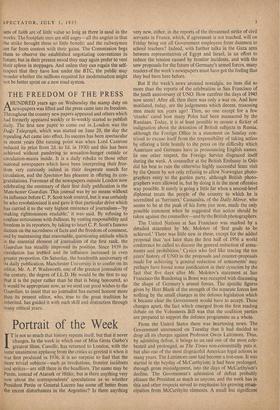THE FREEDOM OF THE PRESS
AHUNDRED years ago on Wednesday the stamp duty on newspapers was lifted and the press came into its freedom. Throughout the country new papers appeared and others which had formerly appeared weekly or bi-weekly started to publish daily. The first new paper to come out in London was the Daijy Telegraph, which was started on June 29, the day the repealing Act came into effect. Its success has been spectacular in recent years (the turning point was when Lord Camrose reduced its price from 2d. to 1 d. in 1930) and this has been achieved without pandering to sensation-hunger outside or circulation-mania inside. It is a daily rebuke to those other national newspapers which have been interpreting their free- dom very curiously indeed in their desperate search for circulation, and the Spectator has pleasure in offering its con- gratulations. Foremost of the newspapers outside London now celebrating the centenary of their first daily publication is the Manchester Guardian. This journal was by no means without its influence before C. P. Scott took control, but it was certainly he who revolutionised it and gave it that particular drive which has carried it to the very highest eminence of journalism—`by making righteousness readable,' it was, said. By refusing to confuse seriousness with dullness, by vesting responsibility and freedom in its reporters, by taking to heart C. P. Scott's famous dictum on the sacredness of facts and the freedom of comment, and by maintaining that reasonable, questioning attitude which is the essential element of journalism of the first rank, the Guardian has steadily improved its position. Since 1939 its circulation has trebled and its influence increased in even greater proportion. On Saturday, the hundredth anniversary of its daily publication, Manchester University is to confer on its editor, Mr. A. P. Wadsworth, one of the greatest journalists of the century, the degree of LL.D. He would be the first to say that it is the paper rather than he that is being honoured, so it would be appropriate now, as we send our good wishes to the Guardian, to insist that no journalist has earned honour more than its present editor, who, true to the great tradition he inherited, has guided it with such skill and distinction through many critical years.














































 Previous page
Previous page